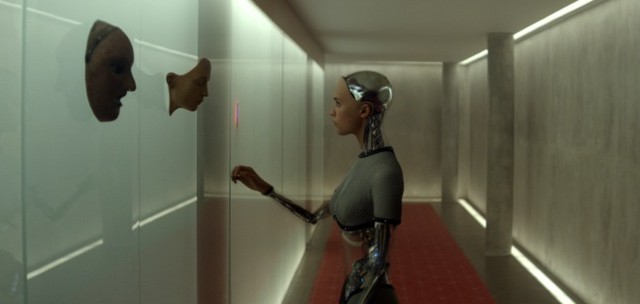Robots tend to permeate pop culture for good reason; they’re so flexible from a storytelling perspective that they can be used for pretty much any plotline you can imagine. Robots can crack wise about low quality movies, fight Kaiju or ask you to bite their shiny metal ass. Everybody from Philip K. Dick to Tobias Carlson have dealt with the idea of robotics and how they’ll affect the human psyche, and now Alex Garland throws his hat into the ring with the film Ex Machina.
Garland, who, in addition to writing this movie, also makes his directorial debut here, takes some cues from one of his past writing credits, specifically the 2007 feature Sunshine, that really help this specific project shine. One element he carries over that truly excels within the confines of the story is a simple structure, with the principal cast consisting of four cast members in a singular location. Removing any sort of extraneous distractions lets the mood and the personalities of the characters resonate with the viewer.
The top billed of those characters is Caleb (Domhnall Gleeson), though the film is truly all about Ava (Alicia Vikander), a humanoid robot that Nathan (Oscar Isaac) has built. Ava is a state-of-the-art piece of machinery, a revolutionary creation that brings the concept of artificial intelligence to life. She’s also a figure bound down by tragedy, with the story removing dialogue in certain scenes, such as one where she puts on clothes and a wig, to help make her sense of longing feel all the more powerful.
I appreciate that Garland doesn’t try to overwhelm the audience in these kind of sequences, but rather lets the visuals and a terrific score courtesy of Geoff Barrow and Ben Salisbury carry the atmosphere of these moments. That aforementioned score is a primary reason why these sections of the movie with Ava work, as the her character is usually accompanied by music that a dream-like quality to it that feels incredibly appropriate considering both how much of a scientific breakthrough she is and her aching desire to escape her creator Nathan (whom she dubs untrustworthy) and to explore beyond the confines of the lab she was made in.
Of course, Nathan won’t have his creation leaving the lab yet, instead letting Caleb interact with his creation as a way of solidifying how lifelike his artificial intelligence truly is. With those sort of lofty scientific plans in his mind, it’s amusing to spend time with Nathan and see his more casual personality. Here;s a guy whose creating pieces of technology that’ll change the world as we know it, yet he seems more fascinated by the sexual organs of Ava and doing some dancing. He can be an intimidating presence in a pinch, but this dichotomy between his artificial intelligence accomplishments and his informal persona (that at times reminded me more of The Dude than anything else) is arresting to watch.
Caleb trying to make sense of Nathans unorthodox temperament and the miracle of artificial intelligence certainly keep the character on his toes, and the same goes for me as a viewer. Garland certainly is accomplished at raising tension in both character development and on the basis of visual components like framing and moments of subtlety (just look at the bit where Caleb convinces Nathan he dropped his key card on the floor). Ex Machina is quite impressive as a movie, especially when it concentrates at the inner pain of Ava, a compelling character driven by a relentless yearning for the world beyond.

